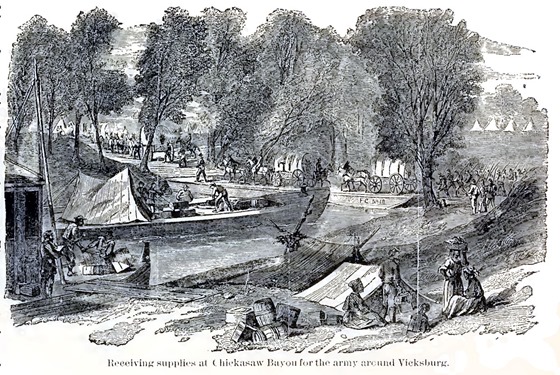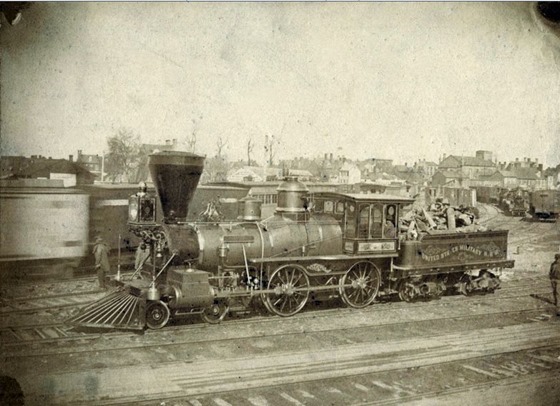1st June (Monday).—We all went to a review of General Liddell’s brigade at Bellbuckle, a distance of six miles. There were three carriages full of ladies, and I rode an excellent horse, the gift of General John Morgan to General Hardee. The weather and the scenery were delightful. General Hardee asked me particularly whether Mr Mason had been kindly received in England. I replied that I thought he had, by private individuals. I have often found the Southerners rather touchy on this point.
General Liddell’s brigade was composed of Arkansas troops—five very weak regiments which had suffered severely in the different battles, and they cannot be easily recruited on account of the blockade of the Mississippi. The men were good-sized, healthy, and well clothed, but without any attempt at uniformity in colour or cut; but nearly all were dressed either in grey or brown coats and felt hats. I was told that even if a regiment was clothed in proper uniform by the Government, it would become parti-coloured again in a week, as the soldiers preferred wearing the coarse homespun jackets and trousers made by their mothers and sisters at home. The Generals very wisely allow them to please themselves in this respect, and insist only upon their arms and accoutrements being kept in proper order. Most of the officers were dressed in uniform which is neat and serviceable—viz., a bluish-grey frock-coat of a colour similar to Austrian yagers. The infantry wear blue facings, the artillery red, the doctors black, the staff white, and the cavalry yellow; so it is impossible to mistake the branch of the service to which an officer belongs—nor is it possible to mistake his rank. A second lieutenant, first lieutenant, and captain, wear respectively one, two, and three bars on the collar. A major, lieutenant-colonel, and colonel, wear one, two, and three stars on the collar.
Before the marching past of the brigade, many of the soldiers had taken off their coats and marched past the General in their shirt-sleeves, on account of the warmth. Most of them were armed with Enfield rifles captured from the enemy. Many, however, had lost or thrown away their bayonets, which they don’t appear to value properly, as they assert that they have never met any Yankees who would wait for that weapon. I expressed a desire to see them form square, but it appeared they were “not drilled to such a manœuvre” (except square two deep). They said the country did not admit of cavalry charges, even if the Yankee cavalry had stomach to attempt it.
Each regiment carried a “battle-flag,” blue, with a white border, on which were inscribed the names “Belmont,” “Shiloh,” “Perryville,” “Richmond, Ky,” and “Murfreesborough.” They drilled tolerably well, and an advance in line was remarkably good; but General Liddell had invented several dodges of his own, for which he was reproved by General Hardee.
The review being over, the troops were harangued by Bishop Elliott in an excellent address, partly religious, partly patriotic. He was followed by a congress man of vulgar appearance, named Hanley, from Arkansas, who delivered himself of a long and uninteresting political oration, and ended by announcing himself as a candidate for re-election. This speech seemed to me (and to others) particularly ill-timed, out of place, and ridiculous, addressed as it was to soldiers in front of the enemy. But this was one of the results of universal suffrage. The soldiers afterwards wanted General Hardee to say something, but he declined. I imagine that the discipline in this army is the strictest in the Confederacy, and that the men are much better marchers than those I saw in Mississippi.
A soldier was shot in Wartrace this afternoon. We heard the volley just as we left in the cars for Shelbyville. His crime was desertion to the enemy; and as the prisoner’s brigade was at Tullahoma (twenty miles off), he was executed without ceremony by the Provost guard. Spies are hung every now and then; but General Bragg told me it was almost impossible for either side to stop the practice.
Bishop Elliott, Dr Quintard, and myself got back to General Polk’s quarters at 5 P.M., where I was introduced to a Colonel Styles, who was formerly United States minister at Vienna. In the evening I made the acquaintance of General Wheeler, Van Dorn’s successor in the command of the cavalry of this army, which is over 24,000 strong. He is a very little man, only twenty-six years of age, and was dressed in a coat much too big for him. He made his reputation by protecting the retreat of the army through Kentucky last year. He was a graduate of West Point, and seems a remarkably zealous officer, besides being very modest and unassuming in his manners.
General Polk told me that, notwithstanding the departure of Breckenridge,this army is now much stronger than it was at the time of the battle of Murfreesborough. I think that probably 45,000 infantry and artillery could be brought together immediately for a battle.












